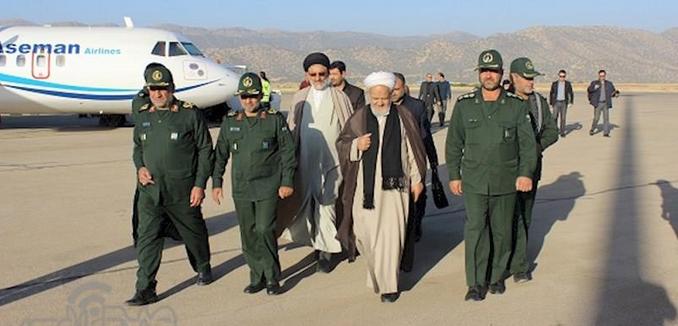In the wake of the incursion of an Iranian drone into Israeli airspace Saturday that led to an Israeli military response against targets in Syria, the United States must “military deterrent toward Iranian expansionism” by targeting Iran’s Islamic Revolutionary Guard Corps (IRGC) positions in Syria, an expert on Iran wrote in an op-ed published Monday in the New York Post.
Richard Goldberg, a senior advisor to the Foundation for Defense of Democracies and a former foreign policy advisor to Sen. Mark Kirk (R- Ill.), wrote that Iran, by sending a drone into Israel, was testing not just Israel’s military response, but also the resolve of the U.S.
Iran, according to Goldberg—who was the author of the toughest sanctions imposed on Tehran before the nuclear deal was agreed to in 2015—doesn’t know what to make of President Donald Trump. While Trump campaigned on taking a tougher stance towards Iran and tearing up the nuclear deal, in practice he has imposed “sanctions on Iran’s Revolutionary Guard Corps” and offered an “uncompromising indictment of the nature of the Iranian regime at the United Nations, but he has not reversed the nuclear deal or taken significant action to roll back Iran’s expansionism.”
Now would be a good time, Goldberg wrote, to “re-establish a robust military deterrent toward Iranian expansionism in close collaboration with regional allies.” Specifically, he recommended that the U.S. “should target key Guards’ bases and weapons in Syria accordingly. Such an approach could help prevent a larger-scale conflict.”
Goldberg explained that Tehran generally prefers “to avoid direct military confrontation against a superior military power.” So, if the U.S. attacks Iranian assets in Syria, Iran would be likely to withdraw. In addition, by raising the cost of Iran’s presence in Syria, the U.S. could exacerbate internal tensions for Iran’s leaders, who are already beset by protests against its foreign involvements.
While there are risks that the Islamic Republic could strike back against the U.S., those threats from Iran exist even before any American action.
Goldberg pointed to three possible benefits to targeting the IRGC. The first is that by raising the cost of Iran’s involvement in Syria, the U.S could lead to a change in Iranian behavior thereby “enhancing security for US allies over the long run.” Another is that by establishing deterrence, the U.S. could force Iran to forgo its “land bridge” to the Mediterranean Sea and give the U.S. and its allies more leverage to renegotiate the nuclear deal and address its weaknesses. Finally, by taking action against Iran, “the United States would reclaim diplomatic leverage over Russia in Syria.”
Without the U.S. confronting Iran directly, Goldberg wrote, “America will keep sleepwalking into an era of Iranian hegemony in the Middle East.”
[Photo: sobhezagros.ir]




